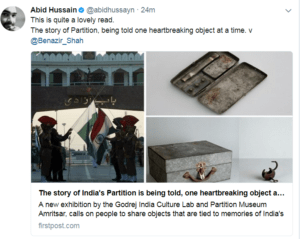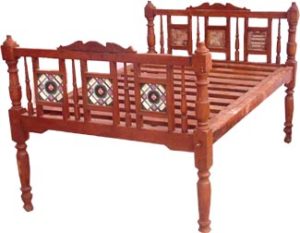I happened to see a tweet about a museum of objects related to partition

and it reminded me of a story I heard about a particular pair of objects, two old-style massive beds (palang) in a house in Jehlum. Since I doubt that this story has been published anywhere, I thought of putting it down here for posterity:
My friend’s maternal grandfather (Nana ji) was an official in the city of Jehlum in Northern Punjab. His family lived in a stately bungalow along the river Jehlum and their neighbors were a Sikh family with whom they had extremely friendly relations. His daughters (including my friend’s mom) were best friends with the Sikh officer’s daughters and frequently played and even slept over in their house. The house on the other side of the Sikh family was occupied by a Muslim engineer who worked in the water and power department. In the summer of 1947 things fell apart in Punjab as the Muslim League’s demand for partition ripped the province apart on communal lines. This was a Muslim majority region (and in fact, because of its long tradition of sending young men into the British Indian army, it was also a major source of manpower for the newly organized paramilitary “Muslim National Guards”) and the Muslim League’s agitation in January 1947 had already started the process of communal violence and ethnic cleansing that would culminate in unprecedented slaughter in late 1947. Nana Ji had asked his Sikh friend if he wanted to move to safer (Sikh majority) areas, but his friend had said “this is my home, I am not political, why would I move?”
Unfortunately, some of his neighbors had other ideas. One afternoon as he walked home from work he was attacked by a group of Muslims and stabbed in the abdomen. Hearing the commotion, Nana Ji and some servants rushed out and carried him into their house. His frightened family also took shelter there. Meanwhile, a Muslim mob ransacked their house. It turned out that the attack had been instigated by the Muslim engineer who lived on the other side of the house; so while one neighbor struggled to save his life, another neighbor had him killed. That is just how it was in 1947.
Within minutes the unfortunate man succumbed to his injuries. His grief-stricken wife wanted to cremate him, but Nana ji pointed out that no such ceremony would be possible as Sikhs and Hindus were being killed all across the city, and the predominantly Muslim police had no interest in protecting them, much less a public cremation. So eventually the two families wrapped him in a white sheet, carried him out on a charpoy (string bed) to the river at the back of the house, and consigned his body to its waters. Nana ji was able to use his contacts to secure safe passage for the poor man’s wife and daughters and they safely made it out to East Punjab. From that day onwards, Nana Ji and his family ended all social relations with the Engineer down the road; and nobody ever went into the Sikh’s house, which became evacuee property and was taken over by some group or the other.
25 years later, the engineer who had instigated the attack passed away. For 25 years, Nana ji and his family had not had any relations with the family, but now that he was dead someone suggested that it would not be proper to stay away on such an occasion, so the ladies of the house (including my friend’s mother, who happened to be visiting her parents) went to pay their respects. When they returned, they were weeping uncontrollably and collapsed on the bed. My friend was very surprised and asked why they were so heartbroken by the death of a man who was known in the family as a murderer and an evil spirit? Between sobs, his mother said “we walked into the house and they had the beds. Those large heavy palangs on which we used to play with out Sikh friends and on which we had slept so many times; the bastards are still using those beds..”
So it goes..
